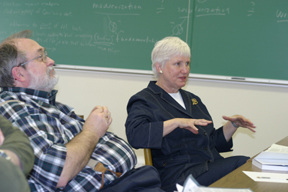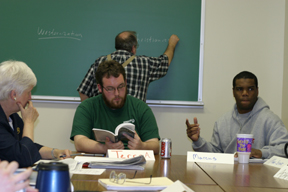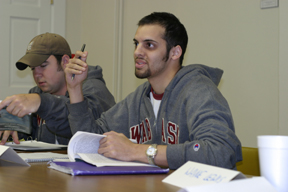
 Dr. Marcia Grant and Professor David Blix |
I’m aware that we have on the Wabash campus a scholar of the Middle East, someone who has "been there and done that" and has real experience as a woman trying to bring about change in a part of the world that resists change.
So I decided to invite myself to a class where the talented Woodrow Wilson Fellow, Dr. Marcia Grant, would be spending some time helping students work through some very difficult issues.
Dr. Grant founded the first women’s college in Saudi Arabia in 1999 and currently is dean of a graduate school in Paris. I was more than curious to eavesdrop on her talk with students in Professor David Blix’s class on religious dialogues—one of several classes she attended during her stay at Wabash.
 Marcus Ellison makes a point while Terry Archambeault listens |
Grant got their attention (and mine) by bringing the theoretical concepts to life. She did so by describing her work in Saudi Arabia, a nation that does not acknowledge Christianity and strictly adheres to Islam. As a Christian, Grant said she knew what she was getting into when she went, and knew that she would not be able to worship publicly while in country.
It was an intellectually curious, but slightly awkward moment, to witness a strong-willed woman talk pointedly about serving in a man’s role in Saudi Arabia—a country dominated by men and one that does not tolerate religious difference. She almost seemed pained that the students were unable to grasp reality of the concepts they were studying.
The students tackled the thorny issues of secularism, fundamentalism, and modernization, and what role, if any, dialogue plays in the understanding of religious cultures.
Grant pulled no punches. She said she believes the only way a nation can ensure dialogue among many religions is if it is governed by secular leaders.
 Ahmed Paarlberg defines fundamentalism |
Blix had each student write a short definition of fundamentalism; Grant was the last to articulate hers, which was essentially a strict interpretation of religious texts based on the fear of—or threat of—change.
I’m not sure I ever thought of religious fundamentalists as those who fear change or feel threatened by the world around them, but it did make sense. Actually, I hadn’t thought deeply about the subject in a very long time. And it led to a fascinating conversation about how to balance that notion in a world that is constantly changing, moving swiftly through modernization. The balance seems impossible to strike when dialogue does not happen, and in so many cases, cannot happen.
Grant summarized the conversation with the personal story of the death of the 17 year-old daughter of her best Saudi Arabian friend and colleague. During the three days of mourning and visitation, Grant struggled in her mind and emotions with the child’s death. "How could it happen to her?" she wondered.
On each of the three days when she attended the visitation, different Muslim women approached her and comforted her with statements like, "It’s Allah’s (God’s) plan." "She was taken by Allah to prepare the way for her parents." "She was a gift from Allah and He has taken her back."
Grant admitted she struggled to see the untimely death in those terms, but acknowledged how important the dialogue was and how meaningful it was for her in understanding Islamic beliefs on death. For Grant, the death of a friend’s young daughter led to an understanding that whether known as "God" or "Allah" there is a place of common ground—and perhaps the beginning of dialogue.
All of my questions weren’t answered during that 75-minute class in a 140-year-old building in a small town in Indiana. But listening to a woman who defied the odds as an American Christian who built a women’s college in Muslim Saudi Arabia convinced me that just about anything is possible, even dialogue between people as different as Christians and Muslims.